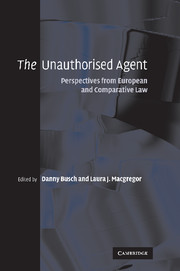Book contents
- Frontmatter
- Contents
- List of contributors
- Foreword
- Preface
- Abbreviations
- Table of cases
- 1 Introduction
- PART 1 The civilian legal systems
- PART 2 The common law
- PART 3 Mixed legal systems
- 9 Unauthorised agency in Scots law
- 10 Unauthorised agency in South African law
- PART 4 International ‘codes’
- PART 5 Conclusions
- Bibliography
- Index
10 - Unauthorised agency in South African law
Published online by Cambridge University Press: 07 September 2009
- Frontmatter
- Contents
- List of contributors
- Foreword
- Preface
- Abbreviations
- Table of cases
- 1 Introduction
- PART 1 The civilian legal systems
- PART 2 The common law
- PART 3 Mixed legal systems
- 9 Unauthorised agency in Scots law
- 10 Unauthorised agency in South African law
- PART 4 International ‘codes’
- PART 5 Conclusions
- Bibliography
- Index
Summary
Introduction
The South African law of agency has been described as a combination of ‘the Roman-Dutch law of mandate and the modern Anglo-American principles of commercial agency’ and it is an area of South African law where the mixed nature of the South African legal system is especially evident. English law, in particular, has had a very strong influence on the development of the South African law of agency. Much of the reason for this lies in the fact that the particular brand of Roman-Dutch law that was imported into South Africa on the sailing ships of the Dutch East India Company and which forms the basis of the South African common law, did not have a particularly well-developed set of rules relating to agency, or at least agency as it is understood in its modern sense. With the British occupation of the Cape, and subsequently the rest of South Africa, English law filtered into many aspects of the South African legal system, and agency was one such area. The comprehensive set of rules and wealth of case-law to be found in the English law of agency provided a welcome resource for South African judges faced with a paucity of Roman-Dutch authority on the subject, and one that they chose to draw on frequently.
Thus, regular reference to English decisions and authorities (and to a lesser extent American and other authorities) can be found in South African case-law and textbooks on agency.
- Type
- Chapter
- Information
- The Unauthorised AgentPerspectives from European and Comparative Law, pp. 300 - 338Publisher: Cambridge University PressPrint publication year: 2009

